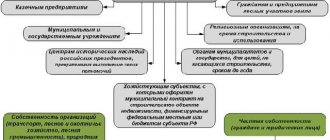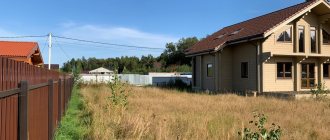Any rights to a land plot must be legalized.
Such rights are subject to state registration by Rosreestr authorities. Registration of the right to use a land plot, the ownership of which belongs to another person, is carried out in any region of Russia, regardless of the location of the land plot.
The complex of registration actions consists of several stages and includes the registrar checking many aspects, starting from the content of documents and ending with the intended purpose and type of permitted use of the land.
Definition and concept
If the plot has one owner, then he does not need to worry about where he will build the house; he decides all issues independently. The situation of joint shared ownership arises if the land is inherited or the spouses divorce.
When the owner has half or a third of the land on which there are buildings and plantings, the question arises: where are the boundaries of each owner’s part? Owners must agree on the rules for using the land in such a way that the interests of everyone are respected. Achieving such an agreement in practice depends on many factors:
- personal relationships between stakeholders;
- the traditionally established procedure for using the site;
- its size and shape;
- the value of the plot (its location, proximity to transport communications, distance from contaminated areas), properties of the land.
Note!
If the actual owners have agreed on how the land should be used, and this agreement does not violate the interests of any of them, then a document is drawn up that consolidates the existing order.
The agreement specifies:
- all legal owners;
- shares owned by them;
- documents confirming the right of ownership;
- the conditions on the basis of which the joint use of the plot is made;
- validity;
- date of agreement;
- signatures of the parties.
The agreement can be notarized, but, according to the law, an uncertified document is considered valid - it has legal force. After the death of one of the owners, sale, or donation of his share, the agreement ceases to be valid, since the new owner may consider the established procedure a violation of his rights.
If the parties cannot come to an agreement and develop an agreement to determine the procedure for using the land, one of them files a claim in court so that it establishes the procedure.
Similar conflicts can also arise when persons using plots of land are not their direct owners (with the right to perpetual use).
To determine relations regarding the ownership of plots, several codes are used simultaneously (LLC of the Russian Federation, Civil Code of the Russian Federation), which makes these disputes extremely complex and requiring the assistance of a professional lawyer for each of the parties to the conflict.
The need for legal advice and assistance from a specialist arises when several actual owners of land cannot agree among themselves on the boundaries of ownership (these can be both legal owners and people who have the right to use the land indefinitely or who have inherited it).
Joint ownership of land
This form of ownership most often arises after inheritance of land by several persons or in a marriage. Everyone owns a certain share of a single, indivisible plot, has the right to use it and benefit from their property. The right of ownership in this case is the right to dispose of a certain part of the property.
If any of the owners wants to sell part of the plot within the limits of the share they own, they must go through a complex procedure for actually allocating it and registering specific ownership rights. Such an allotment should ideally have independent boundaries and not be less than prescribed by law.
Note!
If for some reason it is impossible to allocate a share from the plot, then it will remain single, and the owners will have to agree on the rules for its use. In some cases, a conflict may arise.
Traditional usage
Often, the owners of a plot use the land for years by mutual oral agreement, traditionally, without formalizing this relationship with any document.
The established order is often violated after a change of one of the owners (death or sale of a share). The new co-owner may consider that the usual order infringes on his rights or interests and begin to violate it, using for his own purposes parts of the land plot that the parties previously used together (parking a car, blocking a free passage, unloading building materials in the middle of the yard, etc.).
When the traditional order is violated and the parties cannot reach an agreement, one of them goes to court. A possible outcome will be a new procedure for using the allotment, since the court will have to take into account the interests of all co-owners. In complex cases, the court engages experts.
Actual use of the site
In addition to the traditional one, the actual established order of land use is also possible. It arises when one of the co-owners is physically unable to exercise his right, for example, he lives in another city or is in conflict with another owner.
When registration is not required
Legalization by entering data into the register is always necessary if this is expressly stated in the law. In particular, the obligation applies to lease agreements and land easement agreements. However, there are exceptions. Registration is not required if the term of the lease agreement does not exceed one year or is concluded for an indefinite period.
The copyright holder who received land for use before January 1998 is also not required to go through the registration procedure, but can do this at his own discretion. Such a right is called pre-existing. However, the lack of state registration of a previously arisen right creates certain risks for the copyright holder. Avoidance of mandatory state registration of a previously acquired right to land does not give rise to legally significant consequences for third parties. That is, the actual owner will not be able to prove his status and protect his interest. In addition, counterparties may be required to take legalization actions in court.
Reason for use of the site
After the owners enter into an agreement establishing the joint use of the site, the form of ownership does not change. Each owner is assigned a specific part of the land, while the plot remains intact and is jointly owned.
If necessary, some areas remain common to allow access to living and utility rooms.
A use agreement is different from a division of land. In the latter case, each owner is allocated his share, boundaries are determined, and the original plot ceases to exist.
Note!
Legislatively, the procedure for using a plot of land that is in joint use is regulated by Art. 247 of the Civil Code of the Russian Federation, which fixes the provision that the procedure in accordance with which the parties use joint property depends on the size of their share in this property.
The right to use part of a land plot, which is allocated for perpetual use to the owners of a residential building located on it, is determined by Art. 35 of the Land Code of the Russian Federation.
Between whom is this agreement concluded?
So, in paragraph 1 of Art. 247 of the Civil Code of the Russian Federation states that the ownership and use of property under shared ownership is carried out on the basis of an agreement concluded between its participants.
From the above norm it follows that such a document is drawn up between all co-owners who have a specific plot of land at their disposal.
If the owners of shared ownership fail to reach mutual agreement, then the procedure for using the land can be determined through judicial proceedings based on the decision made.
Determination of the order of use
The land plot has:
- size;
- form - simple or complex;
- buildings located on it;
- placed plantings;
- objects and buildings located nearby or on the territory that may cause difficulties in use.
All these circumstances cause difficulties with the real division of the plot and with the nominal respect for the rights of each owner.
Simple section
For a plot of simple (rectangular) shape with approximately equal sides, without significant buildings and plantings, division into shares in accordance with the part of each owner is not difficult. If it is jointly owned and the owners’ shares are not allocated, they will be considered equal (Article 245 of the Civil Code of the Russian Federation).
Complex shaped area
If the territory is complex in shape and covered with plantings, the actual shares of the land used by the owners may not correspond to their nominal shares. If they cannot reach an agreement on their own, before filing a claim in court, they will have to contact an expert in land disputes about the possibility of isolating a definition of the order of use or dividing it into parts in accordance with the shares of the owners.
Presence of dangerous objects
Such a neighborhood (their list on the territory where the site is located is determined by government agencies) requires a sanitary zone and reduces the land area. To determine the degree of danger and the need to allocate a buffer zone that is unsuitable for use and to preserve the rights of all owners, an expert opinion is needed that will allow the court to correctly establish the procedure for using the site.
An expert in land disputes is a cadastral engineer, a certified person with sufficient experience and knowledge to issue an opinion.
Joint ownership
As a general rule, almost any common property is considered shared property, unless regulations establish that it is joint. Based on legislative norms, joint property is recognized as:
- The property of spouses acquired by them in the union. Taking into account the requirements of Art. 256 of the Civil Code of the Russian Federation, such property will be considered joint, unless it is acquired by the husband or wife before or after marriage, is not received as a gift and does not constitute an item for personal use. At the same time, shares in such property can be established on the basis of an agreement between husband and wife or by decision of a judicial authority.
- Farm property. Based on the interpretation of Art. 6 of the Law “On Peasant (Farm) Economy”, the assets of this association of citizens belong to them by right of joint ownership. However, like spouses, participants in a peasant farm have the right to establish the shares of each of them by concluding an appropriate agreement.
- The property of a gardening or other non-profit citizens' union, which is acquired by this society through contributions from its members, is also joint (Article 4 of the Federal Law of April 15, 1998 No. 66-FZ).
- Privatized property.
The difference from shared property is that the disposal of joint property can be carried out exclusively with the consent of absolutely all co-owners. For example, to sell land owned by a married couple, it is necessary to obtain the consent of the second spouse. In the absence of such, the latter has the right to demand recognition of the transaction as invalid through the court if he proves that the buyer knew, or at least should have known, about the need to obtain this permission.
Joint property can be divided, but to do this, first of all, it must be transferred to shared ownership. Also, creditors have the right to foreclose on a plot that is jointly owned. To do this, it is necessary to apply to the court with a claim for the allocation of a share, and subsequently apply a penalty to the allocated share (Article 255 of the Civil Code of the Russian Federation).
Judicial determination of the order of use
If the parties have not reached an agreement on determining the procedure for using the land, an application to determine the procedure for using the land plot is submitted to the court. The consideration of such disputes is handled by magistrates' courts (Article 23 of the Code of Civil Procedure of the Russian Federation), but if the cost of the site exceeds 500 minimum wages, the claim must be filed with the district court at its location (determined on the day the claim was filed, paragraph 5 of Article 23 of the Code of Civil Procedure of the Russian Federation). All interested parties are brought to court.
Having considered the circumstances of the case, the judge makes a decision in which he determines the procedure for using the land plot by its co-owners, based on the shares they own. If certain conditions arise, the claim may be filed again, the basis for this will be a change in the shares of the owners or their heirs.
Preliminary procedures
Make sure the partition option is available. Newly created plots must comply in size and purpose with the requirements of the law (urban planning, land, civil legislation). Minimum and maximum dimensions can be obtained from the authorities in the field of architecture and construction.
Check whether the boundaries have been established and whether the cadastral registration of the original land plot has been completed. If not, first put in order the documents with the land plot to be divided.
Required documents
Before filing a claim, you should definitely obtain an expert’s opinion with an assessment of the site and possible options for its use or division. Expert opinion helps make a judicial decision, but, as courts say, does not influence it. With the help of an expert, the court receives answers to the following questions:
- is there any development on the disputed territory;
- can an object exist independently;
- what is the exact area of the site;
- are there any discrepancies with documents on this indicator;
- whether the plot is located within the boundaries allocated to it according to cadastral data;
- possible options for division or use in accordance with shares;
- can monetary compensation be awarded for the transfer of a larger share, and in what amount;
- whether work is needed to clear and move buildings or plantings.
- existing restrictions on the use of the plot (sanitary and hazardous areas).
Note!
The court may need a document confirming the value of the land to determine the price of the application and the amount of the fee.
To carry out expert work, the specialist is given copies of all title documents for real estate.
Sample statement of claim
A statement of claim to determine the procedure for using a land plot is drawn up on the basis of Art. Thurs. 131, 132 of the Code of Civil Procedure of the Russian Federation and aims to establish the procedure for the use of a land plot by co-owners in accordance with the size of shares in the property.
The claim states:
- Name and full details of the court.
- Name, patronymic and surname of the plaintiff, place of residence, telephone number.
- Last name, first name, patronymic of the defendant (all defendants must be listed), their addresses.
- The attitude of the parties to the property, the subject of the dispute and the rights of the parties in relation to it.
- Facts that confirm the violation of the plaintiff’s rights, violation of the procedure for using the site, the impossibility of establishing it through an agreement between the parties.
- The plaintiff's demands are to determine the use of the land plot.
To apply, you can use the prepared general form and fill it out.
The form is available for downloading and viewing.
Attached to the claim:
- expert opinion;
- copies of documents on real estate rights;
- original receipt of payment of the duty (300 rubles).
As many copies of the claim as there are defendants are submitted to the court office. The receipt for payment of the state duty is attached to the court copy.
After consideration of the case, a decision is made, which is binding on all parties.
Shared ownership of land
Among the reasons on which the type of property under consideration may arise are the following:
- Emergence from legislative acts.
- Formation as a result of the acquisition of an indivisible object into the ownership of two or more entities.
- Arising from contractual relations.
The share of each co-owner in the type of common property under consideration is usually specified by agreement. Such shares are determined by the contributions of the participants, how much each of them contributed to their common property. So, when buying a plot of land by two persons, if their financial costs are the same, then the share of both will be the same - ½ for each. If their contributions are different, then the shares are determined in proportion to these contributions.
In the absence of an agreement on the establishment of shares, and also if the size of these shares cannot be determined in accordance with the law, they are considered equal.
Why contact a lawyer
Land relations in Russia are extremely complex due to historical circumstances, imperfection of land legislation and little experience of the judicial system in resolving such disputes. A person interested in a positive solution to his problems must take into account a large amount of varied information. The presence of a lawyer with professional knowledge in this matter will help assess the plaintiff’s chances, prepare all the necessary documents and carry out the case in court.
Land disputes usually last a long time and are extremely costly; an experienced lawyer will help find a compromise solution and save the plaintiff considerable sums.
The presence of a lawyer will help predict possible unpleasant moments and tilt the court in favor of the plaintiff.
Service cost
The complexity of land legislation requires consultation with a highly professional lawyer. Due to the complexity of such litigation, he cannot handle several cases at the same time, which makes his services quite expensive. There is no point in saving money - only with the involvement of such a specialist can one hope for a favorable outcome of the trial, otherwise the funds for paying for court preparation services will be wasted. You can ask our specialists all questions. The first consultation is provided free of charge.









